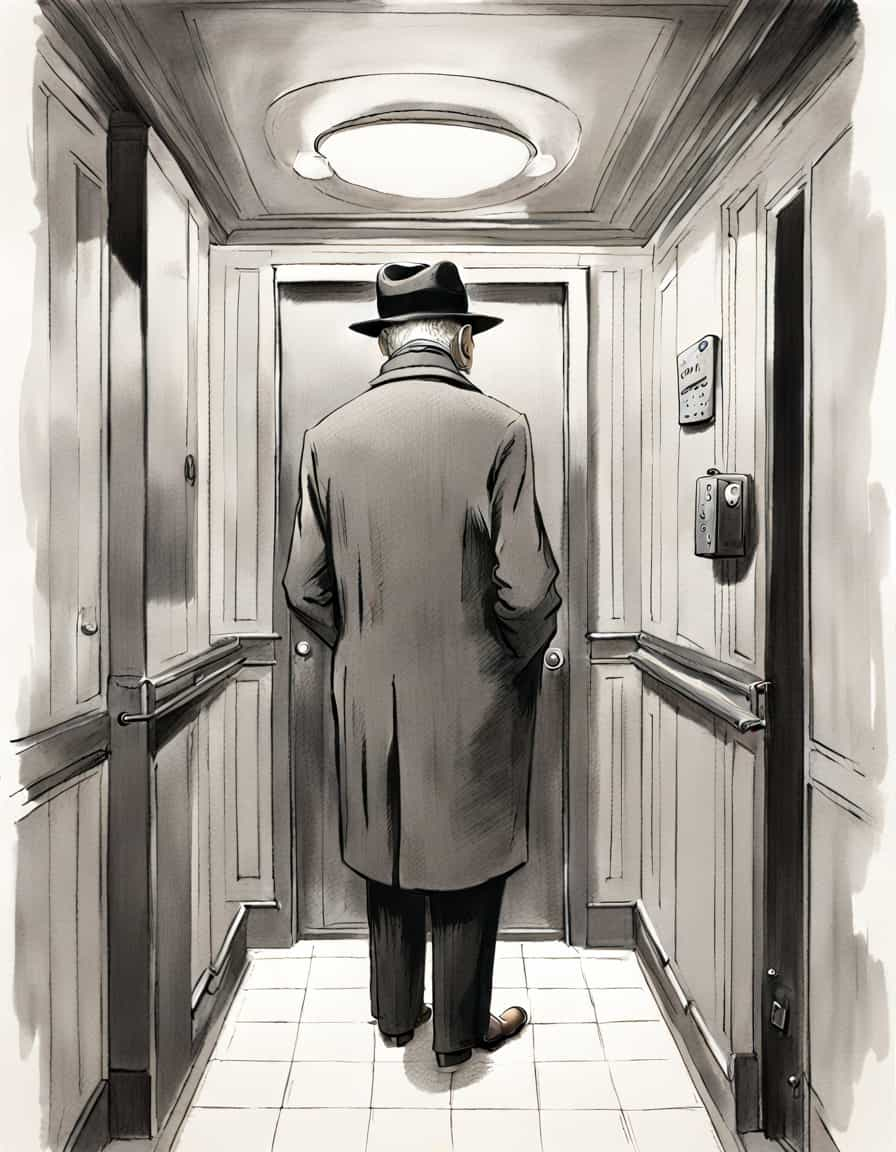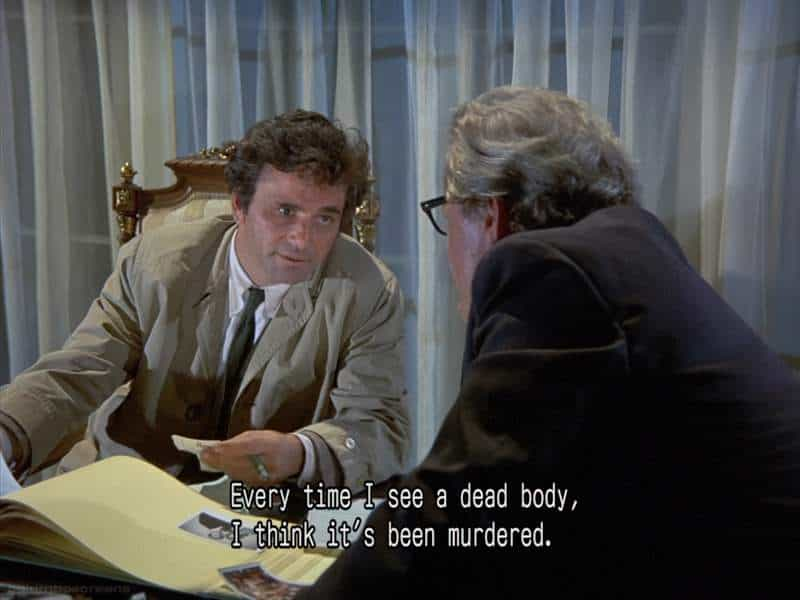“The Way Up To Heaven” is a short story by Roald Dahl. Find it in Dahl’s Kiss, Kiss collection (1959). If you don’t much like elevators, this story won’t do you any favours.
WHERE TO LISTEN
You may be able to unearth the BBC dramatization of this short story somewhere e.g. on YouTube. “The Way Up To Heaven” was broadcast December 2012.
THE PLOT OF “THE WAY UP TO HEAVEN” BY ROALD DAHL
- Mrs. Foster and Mr. Foster live in a luxurious townhouse in New York City. Their daughter lives in Paris with her husband and their grandchildren.
- Mrs. Foster is a meticulous and punctual person who despises tardiness. She has a strong fear of missing appointments or flights.
- Mr. Foster, on the other hand, is a deliberate and manipulative character who enjoys frustrating his wife.
- Mrs. Foster would dearly love to move to Paris to be with her children and grandchildren, but her husband won’t allow it. She’ll visit them for short periods instead. We don’t know why Mr Foster won’t join her.

- The story opens with Mrs. Foster preparing to depart for a six-week trip to Paris to visit her daughter and grandchildren. She is anxious about missing her flight, and Mr. Foster, as usual, delays her departure by insisting she drop him off at the club on her way, and by concealing a gift to their daughter by stuffing it between the squabs in the back of the taxi.
- Frustrated and desperate not to miss her plane, Mrs. Foster leaves without him, locking the townhouse behind her. She takes a taxi to the airport.
- When she arrives in Paris, her daughter and son-in-law are unable to reach him.
- Mrs. Foster eventually returns to New York after her trip, and her townhouse remains locked. No one has opened the mail. A strange small permeates through the building.
- By phone she informs authorities that the elevator appears to be stuck between levels two and three.
- Readers deduce that Mr. Foster has been locked inside the broken elevator for the entire six weeks his wife was away, with no means of escape. He has died of starvation and dehydration.
- Mrs. Foster appears unfazed by her husband’s fate. Readers can guess she will soon be returning to Paris where she will live permanently.
DISCUSSION QUESTIONS
- This is a tale of a husband and wife who don’t seem to like each other very much. Can you think of other Roald Dahl stories featuring spouses who despise each other?
- Can you think of other stories (not just Dahl’s!), including movies, which feature a memorable elevator scene? What happens in those elevator scenes? What genres are the stories?
- Rather than let readers work out for ourselves the nature of the relationship, Dahl’s overt narrator steps in to guide us in how to feel. This makes the story slightly old-fashioned, as authors no longer do this to contemporary readers. Pinpoint the part of the story (near the beginning) where Dahl’s narrator passes judgement.
- Are you the sort of person who would rather be an hour early than five minutes late, or are you more like Mr Eugene Foster, irritated by people who get flustered over possible tardiness? (It’s a spectrum — where do you think you fall?) How does this compare with the people you live (or have lived) with in your life?
- Despite what the narrator tells us, do you find yourself identifying more with Mrs Foster, Mr Foster, with both, or with neither?
- Roald Dahl could have shortened this story further by removing the part where Mrs Foster waits all day at the airport then returns home for another night. But he didn’t. What extra, important information does Mrs Foster’s long, solitary wait in the airport gives readers?
- How do we know for sure that Mr Foster is deliberately making Mrs Foster wait? And does this change your sympathies at all?
- At what point does Mrs Foster deduce what’s happened to her husband? How much do you think she knows?
- Dahl has given us enough information to work out what Mrs Foster will do next. How does she plan to spend the rest of her life? How do we know?
SETTING OF “THE WAY UP TO HEAVEN”
PERIOD
1950s
DURATION
Six weeks
LOCATION
New York City and briefly in Paris.
ARENA
Importantly, Paris is a very long way away from NYC.
MANMADE SPACES
New York City’s JFK International Airport opened in 1948 as New York International Airport and was commonly known as Idlewild Airport. The airport was renamed following the assassination of John F. Kennedy in 1963.
Although this couple is wealthy, they’d have to be even more wealthy to remain in the same residence today.
TECHNOLOGY CRUCIAL TO THIS PARTICULAR STORY
The elevator — less reliable technology when this story was set. Equally important to the story: There were no mobile phones.
LEVEL OF CONFLICT
This story is about the things we put up with — or not — in our spouses or partners. It’s also about the various ways spouses might find freedom from one another.

STORY STRUCTURE OF “THE WAY UP TO HEAVEN”
I was a child of the 80s, when Roald Dahl was the author every kid listed as a favourite. Every day after lunch, our teacher read a story. He took requests.
One day, a kid brought a copy of The Twits to class and requested our teacher read it. But our (conservative, Christian) teacher refused. He said it was too mean-spirited.
Being a troublemaker, I subsequently requested he read “The Cow” from Dirty Beasts, which he had no prior experience with. He read until the last line, then snapped the book shut before delighting us with the cow pat climax. And because that marked the end of storytime on the mat, we were required to get on with something more taxing and boring, so I remember groans from the boys that I had brought a really stupid story and it was too short and I shouldn’t bring another one.
I’m annoyed at my teacher for thinking a cow pat on the head is too much for eight-year-olds, but I now have some sympathy for his feelings about The Twits. It goes beyond mean-spirited. It’s just mean. When I eventually read it myself, I didn’t find it all that funny, except for his invented word ‘the shrunkles’. I think that’s great.
SHORTCOMING
Here’s a short story Dahl wrote for adults, which we can add to the list of Dahlian stories about spouses who hate each other’s guts. But unlike The Twits, in which husband and wife are about evenly matched, the wife in “The Way Up To Heaven” clearly experiences anxiety and in a one-sided way, her husband enjoys passive-aggressively tormenting her. This has been going on for so many years, no wonder her anxiety around being late has gotten worse and worse and worse. (This wife saves her revenge until it’s fatal.)
DESIRE
Mrs Foster desires some freedom. Via her discussion with The Butler, we learn that she feels fortunate that her husband has at least ‘let’ her spend six weeks in Paris visiting their daughter and grandchildren.
For some reason, Dahl saw fit to school readers on where we should lay blame in this relationship. His overt narrator steps in:
Mr Foster may possibly have had a right to be irritated by this foolishness of his wife’s…
“The Way Up To Heaven”
This is perhaps Dahl’s way of reminding us not to judge yet. However, we have carte blanche to judge after we’ve read the entire narrative.
OPPONENT
A husband and wife are each other’s opponents.
The husband seeks to control the wife and gaslights her by alternately calming her anxieties and exacerbating them.
“Oh, stop fussing. It doesn’t matter anyway. It’s bound to be cancelled. You’ve had an entirely wasted morning.”
“Of course, if for some reason it happens not to be cancelled, then I entirely agree with you. You’ll certainly miss it. You may as well resign yourself to that.”
“Oh for pity’s sake, woman. Why must you always make such a fuss?”
“What’s the matter? Don’t you want to drop me at the club?”
“The Way Up To Heaven”
The wife, meanwhile, grows more and more anxious. She wrests whatever small freedoms she can, and spends time away from her husband for short periods.
PLAN
Mrs Foster has previously persuaded her husband to ‘let’ her spend six weeks in Paris. He has agreed. Since his wife will not be there to attend to his every need, he has decided to lay off the staff for that period and spend six weeks at The Club.
Does he really need his wife with him? For him, wait staff are not enough. This evinces a need to control his wife, and has nothing to do with getting his basic 1950s needs met by a wife who can cook, say.
THE BIG STRUGGLE
First, Dahl tells us that the wife hates lateness. Now he must show us how the husband responds to this particular anxiety. To do this, he must show us more than one example. So first we have the husband subtly playing to his wife’s anxieties on their first trip to the airport. Note that it’s subtle. We can’t accuse him yet of being deliberately provocative.
We need to see this happen twice before we can judge. This time it is clear that the husband is deliberately messing with his wife’s head:
- There was no real need for them to take the same taxi when the airport and The Club are in opposite directions.
- It must have been Mr Foster who shoved the gift between the squabs. No one else could have done that.
This is important because it shows the abusive dynamic. I find it interesting that Roald Dahl understood the narcissistic mindset so well.
Roald Dahl was, in many respects, a horrible man. He was a narcissist, a bully, a liar, an anti-Semite, a tax-dodger, a faithless husband and — if his daughter’s account is to be believed — a cruel and thoughtless father.
Sam Leith at The Spectator. (I disagree wholeheartedly with the next statement: That this has nothing whatsoever to do with his books.)
ANAGNORISIS
We eventually learn that Mrs Foster realised what we realised. But we don’t realise she’s realised it yet: That her husband has been torturing her for years by deliberately making her late.
Readers realise when she returns home to a great pile of mail (some of which came from herself) that something happened to her husband.
Dahl hints that Mrs Foster already knew what happened, before leaving Paris. (She’s not sad to say farewell because she senses she’ll soon be back.) If we think back we realise, she was listening to something when she went to retrieve her husband in the house as he made out he was looking for the present. Without actively sabotaging the situation, she heard that the elevator had stopped. This must be a semi-regular and recognisable sound to her, having lived in this apartment building for years. She she sets her mouth in a ‘hard line’, she has made her decision. Just desserts for the dilly-dallier.

NEW SITUATION
We know Mrs Foster will return to Paris after dealing with the dead body, and that her life will be more free as a result. Here’s hoping her daughter and son-in-law are very happy to have her.

EXTRAPOLATED ENDING
Mr Foster was a covert narcissist. More on that below.
RESONANCE
Differing attitudes around tardiness is one of those bugbears which will always cause friction in a relationship. It’s right up there with differences in attitudes around tidiness. One person gets stressed; the other does not. Unfortunately, the person who gets stressed is so often depicted as the ‘crazy’, unreasonable one, and the person who ‘cares’ is so often the woman in a straight relationship, because caring equals weakness.
It may seem like such a silly thing to be stressed about missing the opening to a show, but as a pattern of behaviour, to ensure your partner is constantly late is a form of control.
It reads to me like he’s trying to control you, forcing you to work your entire schedule around his whims.
advice from Captain Awkward, “Getting a co-parent to show up on time & explaining to the child that they aren’t to blame for the lateness.“
In the same 2017 post, Captain Awkward advises documentation. This is to avoid being gaslit. Captain Awkward also advises keeping expectations low, and does not assume that the constantly late person is a reasonable person.
Dr Ramani is another interesting person who educates the public on narcissistic behaviours.
Unlike Roald Dahl’s narrator — a stand-in for Dahl himself — I disagree that the wife and husband each have their own quirks and that the wife is at all responsible for her husband’s ‘very possibly’ having ‘a right to be irritated by this foolishness of his wife’s.’
- Narcissists can’t stand other people being the centre of attention. Mr Foster knows that once his wife goes to Paris, she will be the centre of attention with the grandchildren, to the exclusion of himself. We are not told why he won’t visit the daughter in Paris — it’s likely he felt abandoned once she got married.
- Now he worries Mrs Foster will not want to come home to him. (He’s not entirely wrong about that, either.)
- Mrs Foster is right to avoid getting into a confrontation about Mr Foster’s tricks designed to make her miss her plane. This vulnerability is all unprocessed for them. They will push back in a bad way. Empathy and compassion won’t work.
- He doesn’t want to lose control of the narrative. He has to isolate his wife for his gaslighting to work. This is not in line with Mr Foster’s narrative that his wife is less than him. Narcissists are especially prone to jealousy.
- “Don’t expect me to write you back.” He positions himself above his wife.
- A ‘narcissistic tantrum’ doesn’t always look like a tantrum. It may be something quiet, like we see in this story.
- Narcissists have little insight into their own behaviours. They do stuff that doesn’t necessarily make sense even to themselves. When he stuffed that gift down between the cushions, he probably didn’t fully know why he was doing it.
- Although this is the equivalent of the narcissist’s meltdown, it would appear that Mrs Foster is the one having the meltdown when her anxiety kicks into gear.
- The narcissist ironically positions himself as the one to soothe his wife when things go wrong. Note how he vacillates between saying things to make her more anxious, and calming things ostensibly designed to make her less anxious. (More gaslighty behaviour.)
